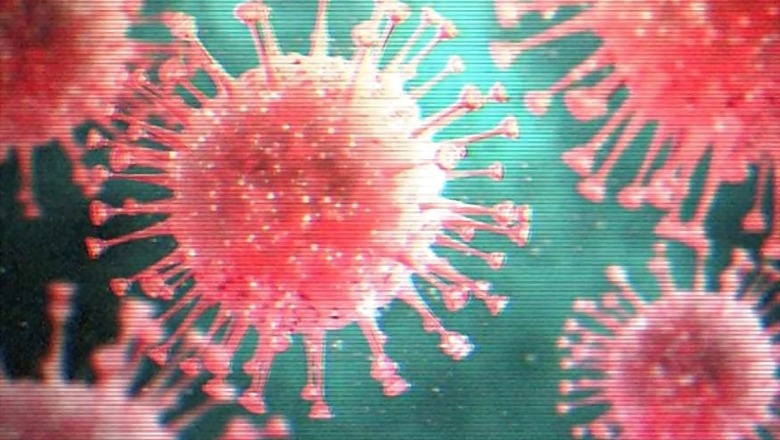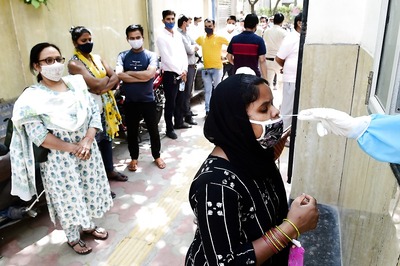
views
The Coronavirus outbreak still shows no signs of slowing down. The Coronavirus, also known as COVID-19 officially, is spreading around the world. At the time of writing this, there are 64,436 confirmed cases of Coronavirus globally and as many as 1,383 deaths because of the virus. No wonder then, that people are scared. They want answers. And they are inevitably doing a Google Search for answers. The search giant has revealed in the UK, the most common questions which people are searching for, about the Coronavirus.
At this time, there are 63,855 confirmed cases of Coronavirus in China, 58 in Singapore, 53 in Hong Kong, 33 in Thailand, 29 in Japan and 28 in South Korea, to name a few. Many in the medical profession are now looking at the worst case scenario with the Coronavirus. “Right now we're in an aggressive containment mode. We don't know a lot about this virus," he said. "This virus is probably with us beyond this season, beyond this year, and I think eventually the virus will find a foothold and we will get community-based transmission,” said Dr. Robert Redfield, Director of Centres For Disease Control And Prevention (CDC) while speaking to CNN. Earlier, Dr Tedros Adhanom Ghebreyesus, Director general of the World Health Organization, told the media that it would still be another 18 months until a vaccine is ready. “To be honest, a virus is more powerful in creating political, social and economic upheaval than any terrorist attack. It’s the worst enemy you can imagine,” he said.
Also Read | This Scary Map Shows How Coronavirus May Be Spreading Globally Through Wuhan Travellers
1. What is coronavirus?
WHO states on its website: “Coronaviruses are a large family of viruses found in both animals and humans. “Some infect people and are known to cause illness ranging from the common cold to more severe diseases such as Middle East Respiratory Syndrome (Mers) and Severe Acute Respiratory Syndrome (Sars).” The novel form of virus commonly known as “coronavirus” has now been named Covid-19.
2. What are the symptoms of coronavirus?
Public Health England (PHE) describes the symptoms of Covid-19 as being “flu-like”. PHE said: “Based on current evidence, novel coronavirus (Covid-19) presents with flu-like symptoms including a fever, a cough, or difficulty breathing.”
3. How many people have died from coronavirus?
The most recent statistics report 1,369 people have died after contracting Covid-19, with 1,367 deaths in China, one in Hong Kong and one in the Philippines.
4. How did the coronavirus start?
On December 31, WHO’s China office heard the first reports of a previously-unknown virus in Wuhan, China. WHO said: “It’s likely that an animal source from a live animal market in China was responsible for some of the first reported human infections. The animal source of the 2019-nCoV has not yet been identified.”
Also Read | Coronavirus Has a Deadly Weapon That You Did Not Know About: The Super Spreaders
5. Is the coronavirus in the UK?
The most recent statistics report nine cases of Covid-19 have been recorded in the UK.
6. Who started the coronavirus?
The virus Covid-19 cannot be traced back to one individual.
7. Is there a cure for coronavirus?
There is currently no vaccine for coronavirus. Patients are being treated at hospital and quarantined to further prevent its spread. WHO states on its website: “To date, there is no specific medicine recommended to prevent or treat the novel coronavirus. “However, those infected with 2019-nCoV should receive appropriate care to relieve and treat symptoms, and those with severe illness should receive optimised supportive care. Some specific treatments are under investigation and will be tested through clinical trials. WHO is helping to co-ordinate efforts to develop medicines to treat nCoV with a range of partners.”
8. How is coronavirus spread?
NHS guidelines state “similar viruses” to Covid-19 are spread in cough droplets, meaning washing hands often with soap could be helpful in reducing the risk of catching the virus. The NHS website states: “Because it’s a new illness, we do not know exactly how coronavirus spreads from person to person. Similar viruses spread in cough droplets. It’s highly unlikely coronavirus can be spread through packages from affected countries or through food.”
9. How many people have coronavirus?
The most recent statistics report 60,368 cases of Covid-19 have been confirmed worldwide, with 59,804 in China, and nine in the UK.
10. Is coronavirus airborne?
WHO states transmission of the virus is “yet to be assessed”, but it is believed it can be spread in cough droplets. WHO says: “For the new coronavirus, we still need to see the data and understand how transmission has been assessed.” The European Centre for Disease Prevention and Control states: “Although there is so far no evidence of airborne transmission, we recommend a cautious approach due to lack of studies excluding this mode of transmission.”
Also Read | Coronavirus: This Website Has A Realtime Map Tracking The Deadly Virus in All Countries




















Comments
0 comment